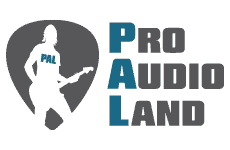TECH TIPS: Tone Terminology
 |
In this article, I’m addressing a topic often asked about. It’s one that often causes confusion, and to be honest, it’s always difficult explaining. When speaking about tone, we all have become accustomed to many familiar terms, but what do they mean? When speaking about tone rather than hearing it, descriptive terms are crucial for conveying our thoughts. I’m not sure I’m an “expert” on this, but I speak with plenty of “tone gurus” on a daily basis, and I’m usually able to understand the terminology and convey my thoughts in the same language. I’m making an attempt to define some commonly used terms. Of course, there is certainly a lot of subjectivity involved.
First, let’s look at terms associated with low end. These are terms I often use and hear:
Fat/Round - to me, fat and round are the same – well defined, sustained, loose, wide or well-dispersed, good depth.
Tight - percussive, holds together very well, fast and responsive.
Chunky - falls in-between fat/round and tight; defined, sustained and loose, but not to the degree of fat/round. It’s percussive, holds together well and is responsive, but not to the degree of tight.
Muddy - beginning to lose definition and articulation, not clear, poor note separation.
Flabby - (often used in a different way, but not appropriate for this article) no articulation, loss of control and definition, negative term for lacking in bass response.
Boomy/Woofing - blooming response, lingering notes, very loose (car stereo comes to mind here).
I also believe you must consider how the bass is pronounced. For example, there’s subdued bass response that sounds fat and round. There’s also more aggressive bass that’s tight, but not “boomy” sounding.
Here are terms and definitions for the mids: Warm - not bright, pleasing, smooth texture, lacks edge in a positive way.
Crisp - clear with edge, bright, raw, but not unpleasant.
Dark - covered up, more extreme than warm in regards to brightness, no edge.
Throaty - thick with depth and growl.
Nasally - dominant mids, overpowering the bass and treble.
Scooped - lack of mids (picture a smiley face EQ).
Human - sorry, I have no idea, but I had a guy use it on me and it makes me laugh.
I believe mids also have a degree of how they are pronounced. You can have dark mids that are well-defined and crisp mids that are more subdued. Think in terms of level.
Here are terms and definitions for top end:
Bright - an abundance of treble or trebly (often used); sometimes a positive term (articulate), sometimes a negative term (harsh).
Articulate – clear with note separation, distinct.
Harsh/Piercing/Ice-Picky - (all the same to me) unpleasant, bad note separation, very harsh, ear fatiguing.
Brittle - similar to or approaching harsh/ piercing/ice-picky, losing articulation and definition, sounds like something’s about to break.
Smooth - rolled-off highs, flatter response peak, less harsh, more pleasant, less or no ear fatigue.
Extended - associated with frequency range, wide bandwidth of treble.
Hiss - noise over top of the note, sounds like pronouncing hiss softly.
Open - fills the room, airy, wide.
Bite – well defined, but not harsh. Here are terms associated with break-up and overall tone in general:
Crunchy - thick, warm break-up.
Vintage - 50s-60s sound, tweed, often associated with alnico speakers and seamed paper cones.
Fendery/Marshally - tone associated with Fender or Marshall. If I have to go into more detail, I’m not sure this article is for you.
British - tones associated with Celestion, Vox, Marshall and Kurt Mueller cones – thick mids, crunchy break-up, harmonic detail.
American - tones associated with Fender, Peavey, Ampeg/SLM, Eminence, CTS, Oxford, Electrovoice and JBL – clean, good clarity.
Compressed - often associated with alnico speakers, volume increases and speaker is pushed harder, but level stays the same
Punchy - tight, percussive, clear, fast, responsive.
Woody - get your mind out of the gutter … a cleaner version of crunchy break-up, very rhythmic
Bluesy - associated with blues tone, warm, smooth, thick, good flow between notes.
Again, I stress how subjective this topic is. We’re likely not going to apply the same term to the same tones we hear, however, I believe we can all come to a basic understanding of what the terms mean. We certainly welcome your comments and feedback.
Original Article
